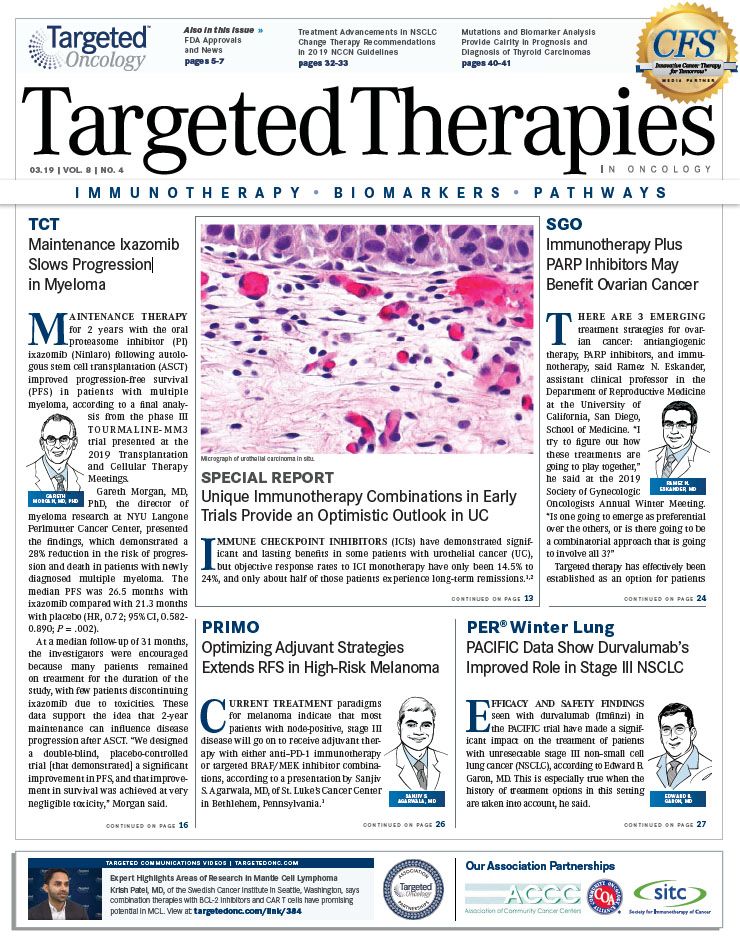Greater Communication and Care Coordination Needed to Stimulate Growth of Immunotherapy, Says ACCC
Less than 20% of healthcare providers feel very comfortable administering and prescribing appropriate and timely treatment to manage adverse events associated with immuno-oncology therapy, according to an independent needs assessment conducted by the ACCC IO Institute.

Less than 20% of healthcare providers feel very comfortable administering and prescribing appropriate and timely treatment to manage adverse events (AEs) associated with immuno-oncology (IO) therapy, according to an independent needs assessment conducted by the Association of Community Cancer Centers (ACCC) IO Institute. Respondents also acknowledged an inefficiency in communication and care coordination between oncology and nononcology providers.
In the report Immuno-Oncology:Connecting Science, Policy, and Real-World Care Delivery, the ACCC IO Institute highlights resources and best practices for healthcare providers delivering immunotherapy and for managing immune-related toxicities, provided by 4 working groups during the IO Institute Working Group Summit held in September 2018.
“Immunotherapy is assuming an even greater importance in the treatment of multiple cancers,” Lee Schwartzberg, MD, chair of the ACCC IO Institute executive committee, said in a statement. “With this new publication, the IO Institute illustrated a concise picture of clinical advances, ongoing and emerging challenges, and information on practice, process-oriented education, and resources from the ACCC IO Institute.”
Each group conducted an environmental scan of key areas, including training and education, telemedicine, big data, and multispecialty care coordination and communication, then brainstormed ideas to improve on the care of patients being treated with immunotherapy. According to the report, the participating clinicians determined that education for immune-related adverse events (irAEs) should expand beyond the oncology team to involve the patient and nononcology specialists, including emergency department providers, hospitalists, and primary care physicians.
For example, in 2018, the ACCC IO Institute published a guide to irAE management,Care Coordination and Immune-Related Adverse Events: Building an Immuno-Oncology Toxicity Team, with insights from a multispecialty immunotherapy toxicity team at The Sidney Kimmel Comprehensive Cancer Center, John Hopkins Medicine, in Baltimore, Maryland. According to the report, this publication, in addition to other guidelines and recommendations, should be used by oncology and nononcology specialists to properly identify and manage irAEs before they become life threatening.
The Training and Education Working Group also emphasized an “urgent need” for education and procedures associated with diagnostic strategies and the clinical use of biomarkers for immunotherapy through a multidisciplinary team. “The multidisciplinary team will need to work with cancer program administrators to leverage resources, such as tumor boards, and develop institutional policies and procedures to determine which biomarker tests to order, identify the team members who would have responsibility for ordering biomarker tests, and determine where the test should be performed,” the report read.
To enhance the efficiency and effectiveness of biomarker use for healthcare providers, the group recommended “centralizing IO pathology services and expertise or cultivating partnerships with larger institutions.” This could be done, they suggested, by establishing a group of pathologists experienced in immunotherapy who could guide other pathologists and healthcare providers in the appropriate use of IO biomarker tests.
The group also suggested that cancer programs develop individual policies and procedures for their providers. In February, the IO Institute held a webinar,Testing the Relationship Between Pathologists, Surgeons, and Oncologists, which discussed the value of determining who will order the biomarker tests, which tests will be ordered, and a list of available agents for patients who have targetable gene mutations. According to the report, all webinar attendees provided valuable ideas for optimizing communication and coordination between pathologists, surgeons, and oncologists when testing for IO biomarkers.
During the summit, the Telemedicine Working Group rationalized the use of telehealthdigital information and communication technologies intended for remote access to healthcare services—as a way to enhance communication and care coordination. “This modality of information exchange is rapidly growing, with approximately two-thirds of all healthcare institutions and half of all hospitals in the [United States] currently using some form of telemedicine,” they said.
The group identified several opportunities for telehealth specific to immunotherapy, including the management of irAEs in small or rural cancer centers that may not have access to certain specialists. For example, patient-reported outcome (PRO) measuresa patient-used telehealth resource to identify irAEs—can be used to speed clinical decision making by allowing a patient to easily alert their providers to potential issues.
However, the group noted the slow uptake for telehealth due to “regulatory hurdles and other structure factors,” such as financial challenges. An additional hurdle, particularly in cancer care, is the lack of face-to-face interaction, which many oncologists value for developing a personal relationship with their patients and caregivers.
“Moving forward, it will be critical to optimize telemedicine adoption in oncology in ways that do not sacrifice quality and that address regulatory hurdles,” the report said. “To this end, the Telemedicine Working Group recommended that ACCC members can partner with organizations…and support efforts around telehealth advocacy and policies.”
In addition to expediting communication between patients and healthcare providers, the Big Data Working Group recommended using data from PROs and other technology modalities as a tool to predict risks, benefits, and outcomes associated with immunotherapy. Big dataor data sets and their associated technologies, such as PROs— provide further access to information for providers to deliver greater clinical care to their patients.
The group, however, acknowledged that integrating big data can be difficult, due to a lack of understanding of the data obtained from these technologies and how they can be implemented in a practice. According to the report, resources to support big data analysis are emerging, including the American Society of Clinical Oncology’s CancerLinQ, which provides access to cancer research data for all cancer care providers.
“Moving forward, partnerships and collaborations between EHR [electronic health record] vendors, pharmaceutical manufacturers, and payers will be important to facilitate access to and analysis of big data,” the report added.
Reference:
ACCC’s new publication helps provide insights to incorporate cancer immunities into practice [news release]. Rockville, MD: Association of Community Cancer Centers; February 4, 2019. accc-cancer.org/ home/news-media/press-releases/news-template/2019/02/04/ accc’s-new-publication-helps-provide-insights-to-incorporate-cancer-immunotherapies- into-practice. Accessed February 12, 2019.

Survivorship Care Promotes Evidence-Based Approaches for Quality of Life and Beyond
March 21st 2025Frank J. Penedo, PhD, explains the challenges of survivorship care for patients with cancer and how he implements programs to support patients’ emotional, physical, and practical needs.
Read More